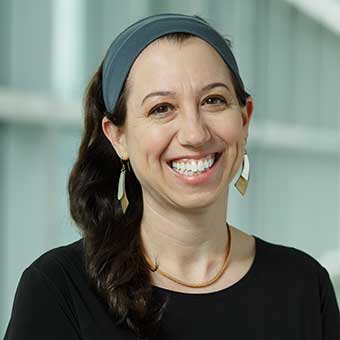Ziva R. Hassenfeld

Jack, Joseph and Morton Mandel Associate Professor of Jewish Education
Assistant Director of Research
Ziva R. Hassenfeld is the Jack, Joseph and Morton Mandel Associate Professor of Jewish Education at Brandeis University, and Assistant Director of Research for the Mandel Center. She studies reading comprehension from a sociocultural perspective, focusing on how children develop interpretations of the Hebrew Bible as a case of student reading development. She uses a variety of qualitative methods including ethnographic observation, stimulated recall interviewing, and think-aloud interviewing.
These investigations connect her to the worlds of biblical hermeneutics, both contemporary and rabbinic, as well as literary theory and criticism.
In addition to her research, Ziva is a passionate educator. She has taught Hebrew Bible in a variety of settings, including at JCDS, Gann Academy, Genesis/BIMA at Brandeis, Silicon Valley Beit Midrash, Stanford Hillel, Congregation Beth Jacobs, Congregation Emek Beracha, Congregation Shaarei Tefilla, Pardes, Brandeis Hillel, and the Lehrhaus. She is a Wexner Fellow and Davidson Scholar, Class 25.
Research Agenda
Ziva Hassenfeld’s research sits at the intersection of language, literacy, and religious education, with a particular focus on how students make meaning of texts and how the power dynamics of the classroom impact that meaning making process. Her first book, The Second Conversation: Interpretive Authority in the Bible Classroom (Brandeis University Press), explores how students and teachers negotiate meaning in the study of sacred texts, foregrounding the generative, cultural, and theological dimensions of textual interpretation. Across her research, she consistently attends to how students’ linguistic and cultural backgrounds shape their engagement with classical Hebrew, biblical texts, and broader religious discourses.
Her current book project extends this agenda by offering a bold counter-narrative to dominant frameworks such as the "science of reading" through investigation of religious reading practices. Rather than treating reading as a technical skill to be mastered for utilitarian purposes, Hassenfeld draws on Jewish mystical traditions, as well as broader religious conceptions of language, to articulate an alternative vision of reading as a sacred, transformative act. She argues that religious literacy practices, especially in communities where language is imbued with spiritual and cosmological significance, open up new possibilities for how we understand reading, comprehension, and meaning-making. This work contributes to growing conversations about the limitations of reductive literacy paradigms and the need to reclaim more expansive, interpretive, and relational models of reading. It offers compelling answers to the current reading crisis we are living through where young students struggle to learn how to read, college students struggle to engage in deep reading, and AI is forcing the question: What is reading for?
MCSJE Projects and Programs
Current
- Reading Religiously
- Research Group on Teaching and Practice in "Crowded Classrooms"
- Student-Centered Religious Learning and Literacy Lab (SCRoLL Lab)
- Seminar on Teaching Jewish Texts
- Teaching During a Time of Crisis
Past
- Online Jewish Education
- Perceptions of Race and Identity in Jewish High Schools
- Pursuing Fluency and Interpretation in the Tanakh Classroom
Highlighted Publications
- Activating Prior Knowledge in Biblical Hebrew: How Day School Students Understand Biblical Hebrew
- Dialogic Discourse and Navigating Discomfort: A Classroom Case Study
- Curriculum on the Front Line: An Ethics of Care During War
- Negotiating the Task of Translation: Modern Orthodox Students Read the Hebrew Bible
(See her faculty page for a complete list of publications.)
Brandeis Courses
Her courses at Brandeis include Reading (and Talking Back) to Research on Education (ED 165a), Religious Education in America (ED 161b), and The Reading Wars: What is Reading? How Do We Learn to Do It? And Why Do We Love to Fight About It?. She has previously taught The Centrality of Literacies in Teaching and Learning, a required course for all teacher candidates in the Stanford Teacher Education Program.
Featured Events
- The Second Conversation: A Conversation with Ziva Hassenfeld
- Spotlight on Jewish Learning: Past, Present and Future | A panel of Brandeis faculty in recognition of the University’s 75th anniversary
- Teaching Reading in Contentious Times
- Learning about Learning: Why Jewish Day Schools Should Teach Students to Read Torah
- Learning to Read in Jewish Education